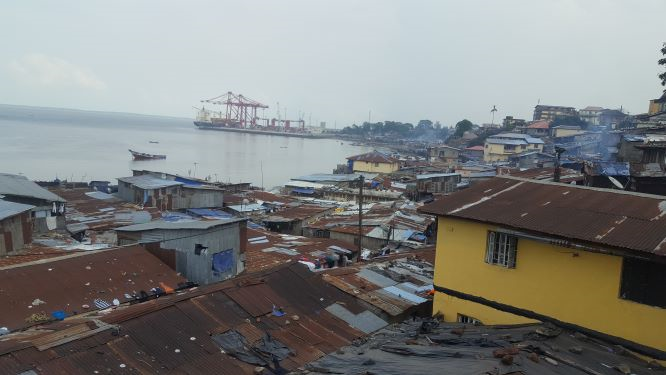
By Mariama B. Bah
December 31, 2020 (232News)
FREETOWN – The significant gains made toward the fight against malaria is seriously threatened at Big Wharf community.
The community which is situated in the Central Business District of Freetown is that the receiving point of garbage. This ugly situation has affected the health of residents of that community more especially women and children.
Chief Yabom Posseh Roy 11 is the traditional chief of that community. She looked depressed when the questions about malaria and the garbage came up.
She said they have been battling with the garbage situation for so long as the drainage posed lot of challenges to that community.
“The drainage is a big challenge to us. During the rains, flooding occurs. We have been on this for long to identify ways and means to solve the problem”.
The huge stock of garbage in that community undermines the fight against malaria as mosquitos flood that community just like the rains.
Chief Yabom Posseh Roy 11 said they have not instituted any bye-laws for those that are throwing garbage in that community but majority of the garbage is from the Cow Yard and Hagan Street that are overlooking Big Wharf community which is close to the seaside.
She disclosed that they received bed nets during the mass distribution but it is not enough for them.
She appealed to the government to come to their aid as they are the only ones that can do such for them.
The community has a lot of mothers with Under 5 babies and most of them leave close to the drainage that is stalked with garbage.
Zainab a mother of 4 explained that she received one treated bed net during the mass bed nets campaign. She said the one bed net is now used by her new born baby while the three kids are sleeping on the floor with no bed net.

Zainab with her 4 kinds and husband leave in a single apartment in that community and they are much close to the garbage center.
She said malaria always affects them, sometimes they go for treatment at the Community Health center at Hagan Street.
Rugiatu Kamara a teenage pregnant girl said she did not have access to the treated bed net because she is sleeping on the floor.
According to the World Health Organisation (WHO) Sierra Leone has one of the highest burdens of malaria in the world. The country’s entire population is at risk of the disease and it is one of Sierra Leone’s leading causes of death and illness.
Young children are particularly susceptible to infection, illness and death from malaria. In Sierra Leone, the disease contributes to close to an estimated twenty percent of child mortality.
Sierra Leone has achieved vast declines in malaria deaths between 2010 and 2015, the highest in Western Africa. This is linked to a range of interventions, including increased availability of diagnostic tests, free treatments and mass distribution of insecticide treated nets (ITNs).
Community Health Officer CHO Kadiatu Daramy said major cases in that health centre are Malaria, Typhoid, hypertension, diabetics, STI.
She underscored the point that Malaria drugs and testing are free but payment for all other medicines are not free.
“Some have contracted malaria but they can’t afford the cost which is why quack doctors are all over in this community. They go for drugs that they are not sure of curing them because it is cheaper. “
She said at times, family members abandon patient in the centre. I saw one patient that was abandoned by his parents because the nurses said it is needed to the referred to bigger hospital because scan and other advance test is needed.
Most of the malaria cases we have are not in a worse stage unless the kids that sometime be in a stage of convulsion (heavy fiver) because some of their parents preferred to give them paracetamol at home.
She confirmed that bed nets were distributed in the community and every Thursday they are doing outreach.
“Early diagnosis and treatment of malaria reduces transmission of the disease and prevents deaths. It is critical that people seek diagnosis and care as soon as they experience any symptoms of malaria. Early symptoms can include fever, chills, body aches and headache,” Community Health Officer CHO Kadiatu Daramy said.
Minister of Health and Sanitation Hon. Dr. Alpha T. Wurie explained that progress against malaria is under threat. COVID-19 is taking hold of global health discussions and public health efforts, with recent World Health Organization modelling data suggesting that the pandemic threatens to double malaria deaths in 2020 alone.
“We cannot let the fight against COVID-19 come at the detriment of our mission to end malaria, and it is crucial that countries across Africa continue to scale up their malaria programs and ensure that this disease remains a priority for the continent. After all, malaria continues to claim the lives of over 400,000 people each year globally.”
He continue to say everyone in Sierra Leone is affected by malaria, which is why they have engaged a wide range of stakeholders from all areas of society: members of parliament, mayors, religious leaders, paramount chiefs, the media, local councils, health and government officials, civil society organizations, traders, celebrities, footballers, models, actors, musicians and comedians. Using their voices and influence, these leaders are essential for ensuring people know how to stay safe and to seek diagnosis and treatment if experiencing a fever.

